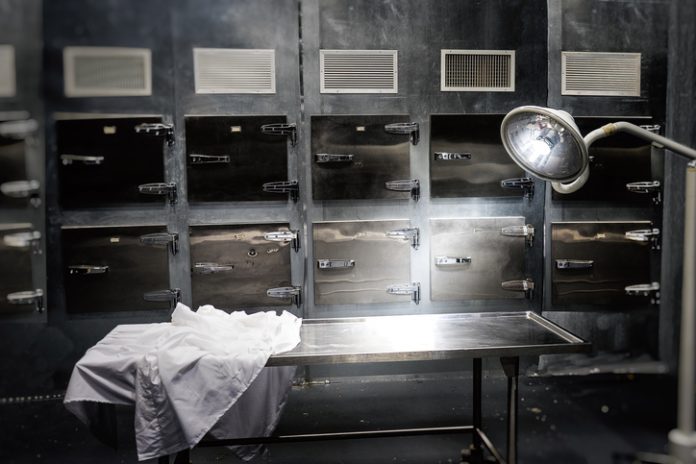The Alabama Department of Corrections is under fire after families alleged that, in two separate incidents, the bodies of inmates Brandon Clay Dotson and Charles Edward Singleton were returned with their organs removed.
A lawsuit filed by Dotson’s family alleges a pattern, citing the Singleton case and complaints by University of Alabama medical students alarmed by what they claim are lax ethics in obtaining organs from prisoners for education and research.
Families Become Suspicious
Suspecting foul play in the November 2023 death of Dotson, the family hired a pathologist to conduct a second autopsy. The autopsy revealed that Dotson’s heart had been removed, prompting the lawsuit. The family also alleges the body had been improperly stored and was in a state of decomposition, necessitating a closed coffin funeral.
Singleton’s daughter, Charlene Drake, provided a statement to Lauren Faraino, the attorney in the Dotson case, that Drake was informed by the funeral home her father’s body was returned with no internal organs. Drake said she was told by the funeral home that organs removed during an autopsy are normally returned in a bag placed in the body cavity.
Singleton’s family was also notified the body was returned in a state of decomposition characterized by “advanced skin slippage.” The brain was also missing. Singleton died while incarcerated in November 2021.
‘Organs Are Not Returned’
Cynthia Gould, a reporter from Birmingham TV station WBMA, who was investigating the Dotson and Singleton cases, obtained a statement from the University of Alabama at Birmingham (UAB) Department of Pathology, which conducted the original autopsy, regarding its policy for disposition of removed organs.
“In an autopsy, organs and tissues are removed to best determine the cause of death,” the department stated. “Autopsy consent includes consent for final disposition of the organs and tissues; unless specifically requested, organs are not returned to the body.
“UAB is among providers that—consistent with Alabama law—conduct autopsies of incarcerated persons at the direction of the State of Alabama. A panel of medical ethicists reviewed and endorsed our protocols regarding autopsies conducted for incarcerated persons.”
Lack of Consent
Faraino says exhibits in the case show a group of UAB Medical School students in 2018 noticed a disproportionate number of the specimens they encountered in their lab studies were from people incarcerated at the time of death.
These students raised ethical concerns with the administration and even met with the UAB Ethics Committee. The exhibits Faraino gave Health Care News appear to demonstrate that UAB was aware of the lack of donor consent for the retention or donation of organs obtained from prisoners.
Exhibit B, which is a summary of a meeting between concerned students and UAB doctors identified as Reilly and Litovsky, states that the “Consent process involving specimens in the lab DOES NOT involve the patients or their families. The prison warden provides consent and always signs for ‘no restrictions’ on what specimens can be used for, which includes their use for research and teaching purposes.”
Students go on to state that the doctors did not appear to have concerns that the practices were unethical. Another document identified as Exhibit C characterizes a November 26, 2018, meeting between concerned students and UAB administrators as “unproductive” and cites concerns the students were (falsely) accused of being “inflammatory.”
‘Explicitly Refuse to Donate’
Heidi Klessig, M.D., a retired anesthesiologist and authority on clinical death, is a harsh critic of so-called “opt-out” laws that recognize de facto consent absent an overt refusal by the subject to waive rights or refuse consent, turning the concept of informed consent on its ear.
“The 2006 update to the Uniform Anatomical Gift Act (UAGA) now mandates that people must explicitly refuse to donate tissues or organs,” said Klessig. “This case highlights the problems with an ‘opt-out’ system, one that takes organs unless the individual or family specifically refuses.
“Such a system has great potential for abuse, and not just for Alabama prisoners. The UAGA empowers the coroner, medical examiner, or even the hospital administrator to make an anatomical gift of the decedent’s body or part if the person has no documented refusal to donate and their family or surrogate cannot be located within 12 hours.”
‘Trafficking Body Parts’
Klessig points out that other abuses have come to light, such as the September 2023 scandal when workers at the Harvard Medical School morgue were caught allegedly stealing human remains and selling them to “oddity” traffickers.
“It is possible these Alabama cases represent another example of trafficking body parts to oddities dealers,” said Klessig. “I recommend that everyone protect themselves by documenting their refusal to be an organ or tissue donor by adding a refusal to donate to your advanced directive and electronic medical record, and by carrying a wallet card stating your refusal.”
‘Horrors Do Not End at Death’
“Alabama’s prison system is characterized by cruelty,” said Faraino. “From the moment a person enters the Alabama Department of Corrections, they are thrown into a lawless world of beatings, rapes, drugs, and extortion. No other prison in the United States comes close to Alabama’s in terms of violence, suicides, and overdoses.”
The abuses and indignities continue after a prisoner’s demise, says Faraino.
“We are now learning that the horrors do not end at death,” said Faraino. “Institutions that society should be able to trust are abusing the corpses of those who die in prison custody. The families of these individuals are being disrespected and taken advantage of during their time of deepest grief. Such outrageous conduct by state leaders must not be tolerated by any civilized society.”
Kevin Stone (kevin.s.stone@gmail.com) writes from Arlington, Texas.





















